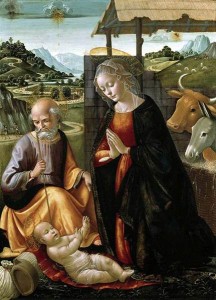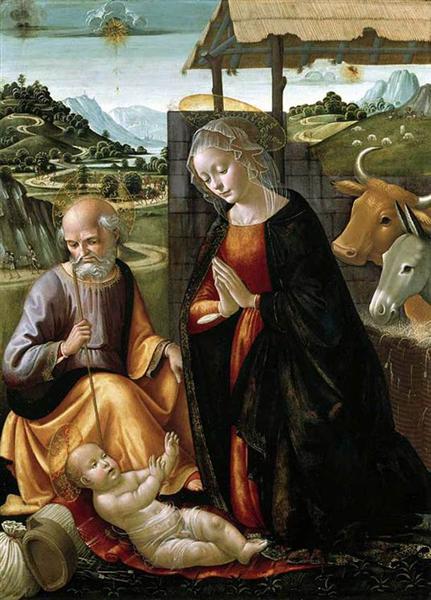
Central idea: The Prince of Peace is born. Doctrine: The marvelous exchange. Practical application: Becoming littler.
To view Lectionary 14, click here.
Central idea: The Prince of Peace is born
Reading 1 Is 9:1-6
The people who walked in darkness
have seen a great light;
upon those who dwelt in the land of gloom
a light has shone.
You have brought them abundant joy
and great rejoicing,
as they rejoice before you as at the harvest,
as people make merry when dividing spoils.
For the yoke that burdened them,
the pole on their shoulder,
and the rod of their taskmaster
you have smashed, as on the day of Midian.
For every boot that tramped in battle,
every cloak rolled in blood,
will be burned as fuel for flames.
For a child is born to us, a son is given us;
upon his shoulder dominion rests.
They name him Wonder-Counselor, God-Hero,
Father-Forever, Prince of Peace.
His dominion is vast
and forever peaceful,
from David’s throne, and over his kingdom,
which he confirms and sustains
by judgment and justice,
both now and forever.
The zeal of the LORD of hosts will do this!
- Every human being walks in darkness. Every human being is oppressed, even the ones who oppress others. Every human being needs salvation. This salvation is beyond the power of any mere human being to establish.
- Through Isaiah, God promises an everlasting, just, wise, powerful king who will end war and establish peace. This king in the line of David will set free the oppressed.
- Jesus Christ—no mere man but true God and true man—is this Prince of Peace. He established this Kingdom of Peace by the Redemption he won for us. We await its full establishment when he returns in glory.
Responsorial Psalm PS 96: 1-2, 2-3, 11-12, 13
R. Today is born our Savior, Christ the Lord.
Sing to the LORD a new song;
sing to the LORD, all you lands.
Sing to the LORD; bless his name.Announce his salvation, day after day.
Tell his glory among the nations;
among all peoples, his wondrous deeds.Let the heavens be glad and the earth rejoice;
let the sea and what fills it resound;
let the plains be joyful and all that is in them!
Then shall all the trees of the forest exult.They shall exult before the LORD, for he comes;
for he comes to rule the earth.
He shall rule the world with justice
and the peoples with his constancy.
- On account of his salvation, we rejoice in recalling the birth of our savior. This joy is only a prelude to the joy when this salvation is finally fulfilled.
- Not only will men rejoice, even nature will be glad. As St. Paul says, “creation itself will be set free from its bondage to decay and obtain the glorious liberty of the children of God. We know that the whole creation has been groaning in travail together until now; and not only the creation, but we ourselves, who have the first fruits of the Spirit, groan inwardly as we wait for adoption as sons, the redemption of our bodies.” (Rom 8:21-23)
Reading 2 Ti 2:11-14
Beloved:
The grace of God has appeared, saving all
and training us to reject godless ways and worldly desires
and to live temperately, justly, and devoutly in this age,
as we await the blessed hope,
the appearance of the glory of our great God
and savior Jesus Christ,
who gave himself for us to deliver us from all lawlessness
and to cleanse for himself a people as his own,
eager to do what is good.
- We live in the period between two great events: the Incarnation and the Second Coming.
- Our condition is that we have God’s grace to attain salvation and the gift of hope that we will obtain it.
- Therefore, we must learn to live a certain way in order to become a certain kind of person.
- The way we live requires rejecting evil (godless ways, worldly desires, lawlessness) and embracing a life of virtue (temperance, justice, piety).
- The kind of person we must become is one without sin and eager to do good. We can become this kind of person because of Christ’s saving grace we receive through the Sacraments which cleanse and strengthen us.
Gospel Lk 2:1-14
In those days a decree went out from Caesar Augustus
that the whole world should be enrolled.
This was the first enrollment,
when Quirinius was governor of Syria.
So all went to be enrolled, each to his own town.
And Joseph too went up from Galilee from the town of Nazareth
to Judea, to the city of David that is called Bethlehem,
because he was of the house and family of David,
to be enrolled with Mary, his betrothed, who was with child.
While they were there,
the time came for her to have her child,
and she gave birth to her firstborn son.
She wrapped him in swaddling clothes and laid him in a manger,
because there was no room for them in the inn.Now there were shepherds in that region living in the fields
and keeping the night watch over their flock.
The angel of the Lord appeared to them
and the glory of the Lord shone around them,
and they were struck with great fear.
The angel said to them,
“Do not be afraid;
for behold, I proclaim to you good news of great joy
that will be for all the people.
For today in the city of David
a savior has been born for you who is Christ and Lord.
And this will be a sign for you:
you will find an infant wrapped in swaddling clothes
and lying in a manger.”
And suddenly there was a multitude of the heavenly host with the angel,
praising God and saying:
“Glory to God in the highest
and on earth peace to those on whom his favor rests.”
- The Gospel or “good news of great joy that will be for all the people” was preached publicly for the first time by an exalted angel to lowly shepherds. Born “for them,” for these nobodies, was a “savior” who is “Christ” and “Lord.”
- Bethlehem is the city where David, the greatest king of Israel, was from. So once, a long time before, somebody great came from Bethlehem, but by this time it was no place.
- Where these nobody shepherds would find this Savior, Christ, and Lord, was a no place within this no place: a cave or outbuilding or stable or bottom floor in which animals were housed, for the baby was given a manger for his bed.
- This baby, wrapped in swaddling clothes like any other newborn, was in fact the heir of King David, and would fulfill all the promises God made to Israel through David.
- After the angel’s announcement, the suddenly-appearing-heavenly host sang, “Glory to God in the highest and on earth peace to those on whom his favor rests.”
- This good news for men on earth is that those on whom God’s favor rests are given the gift of peace. What is this peace?
- Peace is the absence of the ruin of war.
- Peace is also safety and security.
- Most of all, peace means the end of alienation. Alienation or conflict is our fallen human condition. Every innocent newborn eventually discovers this.
- There is enmity with God.
- There is conflict with other persons—even those we love and those who love us.
- There is the struggle with nature, which does not care about us and can harm us.
- And there is also self-alienation. While it is true that no man ever hated himself (Eph 5:29), in trying to love ourselves we can definitely harm ourselves.
- How can we partake of this promised peace? How can we get God’s favor to rest on us? Well, because we are here, Baptized in Christ, we have this peace. If we have lost it through sin, we can get it back through the Sacrament of Reconciliation. And we can increase in this peace through the Sacrament of the Eucharist.
- The newborn Savior, Christ, and Lord was placed in a manger, a feeding trough, not for cows but for men. The manger in which Our Savior is placed for us at each Mass is the chalice and paten in which bread and wine are consecrated and changed in substance to the Body, Blood, Soul, and Divinity of the Savior, Christ, and Lord.
Doctrine: The marvelous exchange
- Jesus’ birth was a juxtaposition of earthly poverty and heavenly glory. “Jesus was born in a humble stable, into a poor family.” But the “simple shepherds” who “were the first witnesses to this event” beheld “heaven’s glory,” visible in the angels, invisible in the baby. (CCC 525)
- Christmas is the mystery of a “marvelous exchange”: Man’s Creator became man so that man can share in the divinity of Christ. But just as the Creator humbled himself in taking on human flesh, we too “must humble ourselves and become little,” “children of God,” “a child in relation to God.” (CCC 526)
- Baptism makes us children of God. With the help of grace, we can become as docile, trusting, receptive, and loving as children.
Practical application: Becoming littler
- How can grownups become more like little children in the good sense God desires?
- We can ponder that we are creatures, made by God with a certain human nature, accept this nature and creaturely condition with gratitude, and embrace and live it.
- One dimension of this creatureliness is our real dependence on God and other human beings. Radical individualism, which is such a part of Western culture, cannot be our ideal. Rather, giving the gift of self to others and receiving others’ gifts are worthy ideals.
- Another dimension of our God-made human nature is that God has made the marital act to have the unitive and procreative meanings that we should never separate, so we won’t. In other words, we embrace the sixth and ninth commandments in their fullness as taught by the Church.
- Another dimension of our creatureliness is that we are mortal and so our time on earth is limited. We don’t have forever to do good and we will be judged.
- We can also ponder that we are redeemed by Christ, saved by him and in the process of being sanctified. We can also accept this reality and condition with gratitude, and embrace and live it.
- Consequently, we talk to God in prayer and listen to his Word in response.
- We go to the sources of grace God has provided through his Church, namely the Sacraments, especially Penance and the Eucharist.
- We also take up going to attend the “school” Christ provides for us, the school of become the kind of person who rejects evil, seeks virtue, and is eager to do good.
- We can ponder that we are creatures, made by God with a certain human nature, accept this nature and creaturely condition with gratitude, and embrace and live it.

Leave a Reply